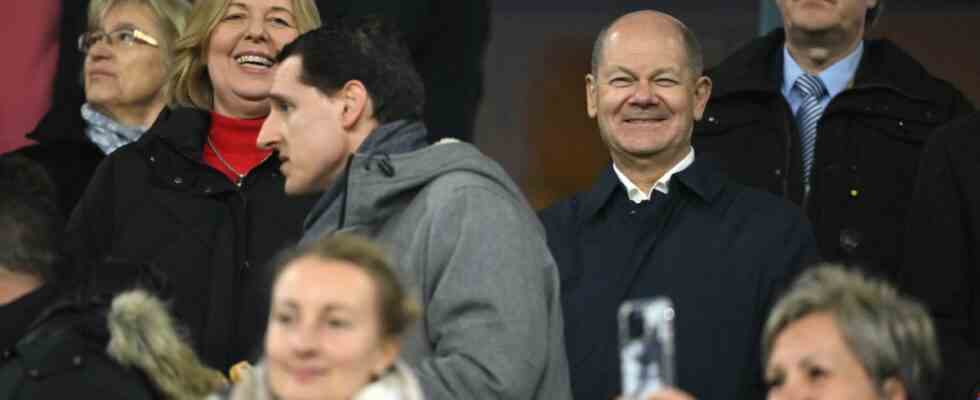That evening almost ended in defeat, only millimeters were missing, and Stina Blackstenius’ shot would have ended up in the goal in the 79th minute. And as soon as the German internationals had recovered their composure, Johanna Rytting Kaneryd hammered the ball on goal, now it was the post that stepped in as a protective shield. This encounter remained intense until the end, the team of national coach Martina Voss-Tecklenburg had to fight and run and work until the end – and in the end be happy about a 0-0 draw against Sweden.
“It was an intense game from both teams, it was a lot about robustness and athleticism,” German winger Klara Bühl told ZDF. “In the end, the Swedes were maybe a bit more intense. We have to take credit for giving away a lot of balls.”
This international match marked the start of the year of the World Cup in Australia and New Zealand, it was the first serious test and against a strong opponent. A year ago at this time, the Germans had been difficult to classify internationally, now they appeared as those who could only be stopped by the English women in the final of the 2022 European Championships and thus reported back on the big stage after two disappointing tournaments.
Goalkeeper Merle Frohms was tested for the first time in the seventh minute, Felicitas Rauch misjudged a pass and if Frohms hadn’t had the ball fast enough, Sweden would have taken the lead early on through Sofia Jakobsson. In the 22nd minute, the ball actually flew behind the goal line after a header from Stina Blackstenius – the luck of the Germans was the Arsenal player’s offside position. At the start of this game, the deficit would have fit. The Swedes put a lot of pressure on early on. The German team had trouble with offensive actions, Sara Däbritz shot just wide (25th).
“The meeting with the Federal Chancellor was an interesting first exchange,” says the national coach
20,169 spectators came to the Duisburg stadium, including Chancellor Olaf Scholz. Before kick-off, he exchanged views with the national coach and then campaigned again on ZDF for equal bonuses for national players. “I stay on the ball and I will continue to do so,” said Scholz, who also sat down with DFB President Bernd Neuendorf. During the EM, the enthusiasm for the football of the DFB women was great. “I hope that the trend will continue and that I can strengthen it a little bit,” said Scholz. Last year, during the European Championships, he had spoken out in favor of equal bonuses. “The meeting with the Federal Chancellor was an interesting first exchange that we would like to maintain and continue in the future,” said Voss-Tecklenburg.
Also in her 125th international match, Alexandra Popp stood out with her commitment – on the offensive as well as on the defensive.
(Photo: Oliver Baumgart/foto2press/Imago)
The national coach hardly came to rest on the sidelines. She paced back and forth conducting and calling out to the square. But it was the Swedes who kept creating chances. Filippa Angeldahl’s shot went just over it (27′) and Kosovare Asllani’s (33′) was just close to Frohms thanks to a strong save. The fact that Jakobsson didn’t celebrate after a corner just a minute later after she had pulled away undisturbed was due to an acrobatic save by Alexandra Popp. The striker switched to the role of defender and jumped into the shot with a wide split, the ball bounced off her leg.
Popp and Voss-Tecklenburg have a special connection to Duisburg
This evening brought a small anniversary for the captain, she has now completed 125 international matches. And it came full circle. Because Popp also played her first game in the national jersey against North Korea (3-0) in 2010 as an 18-year-old in this city. “I grew into a national player in Duisburg and played my first international match there,” said Popp beforehand. “More Duisburg is almost impossible.” Here she made her Bundesliga debut at FCR 2001 Duisburg in 2008 – with Voss-Tecklenburg as coach, to whom she has now caught up with the DFB appearances. For the national coach it was even more of a home game than for Popp. The 55-year-old was born in Duisburg and played for FCR for years before later leading the team to two DFB Cup victories and winning the Uefa Women’s Cup, today’s Champions League .
Shortly before the break, Frohms and defense chief Marina Hegering still needed to speak, somehow it didn’t all go as planned. And in the second half, the German build-up remained bumpy. Voss-Tecklenburg substituted Lena Lattwein for Sjoeke Nüsken and later tried to liven up the offensive with Lea Schüller for Lina Magull. Jule Brand came for Klara Bühl, Laura Freigang for Sophia Kleinherne. Then also Tabea Waßmuth for Svenja Huth and Janina Minge for Sara Däbritz. Lots of fresh energy for a final gasp. In this constellation, their players freed themselves and they became more dangerous – but not dangerous enough.

